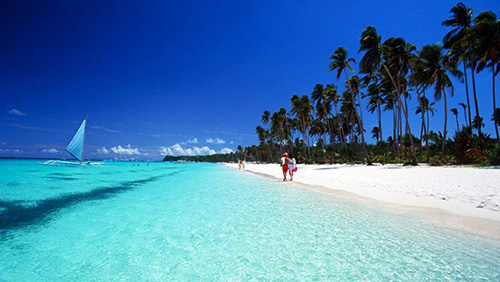Following the six-month mandated closure, Boracay Island in the Philippines is now open for business – sort of. The island has begun to accept Filipino visitors and there are still no plans to allow gambling back on the island.
 The island is only open to Filipinos currently in what the government is calling a soft launch. Once it’s sure that everything is running smoothly, it will open the island to other nationalities as of October 26. It has been closed since April 4 when President Rodrigo Duterte ordered it closed. At the time, he called it a “cesspool” and shut it down so that the beach and the infrastructure, such as sewage pipes, could be cleaned.
The island is only open to Filipinos currently in what the government is calling a soft launch. Once it’s sure that everything is running smoothly, it will open the island to other nationalities as of October 26. It has been closed since April 4 when President Rodrigo Duterte ordered it closed. At the time, he called it a “cesspool” and shut it down so that the beach and the infrastructure, such as sewage pipes, could be cleaned.
There is limit to the number of visitors per night allowed in the area. Only as many as 19,000 are allowed before the rest get kicked out. The island is also now a permanent non-smoking area and no alcohol is allowed. There will be restrictions on the types and quantities of watercraft and watersports allow and many types of plastics, such as drinking straws and bags, are prohibited.
The limit in visitors will obviously result in less numbers, especially during peak times. According to the Philippines Department of Tourism, major holidays have typically attracted up to 50,000 nightly arrivals to the island.
The cleanup process was conducted by local residents, although not necessarily through their generous, charitable nature. They were each paid $6 per day and the final tab for the cleanup came in at about $18.5 million.
Gambling will still not be allowed on the island, at least not in the near future. Galaxy Entertainment has plans to build a $500-million casino on the island after it received a provisional license from the Philippine Amusement and Gaming Corporation (PAGCOR). The license was given prior to the island’s closure; however, Duterte later denied the validity of the license and said that Galaxy was out of luck.
With that, Galaxy might decide to look elsewhere for its expansion efforts. The company is considering fighting for one of the three Japanese licenses expected to be issued in the near future. The company’s founder and CEO, Lui Che Woo, has said that a Japanese operation would have a greater focus on non-gaming activities, the same argument he gave for the Boracay Island proposal.